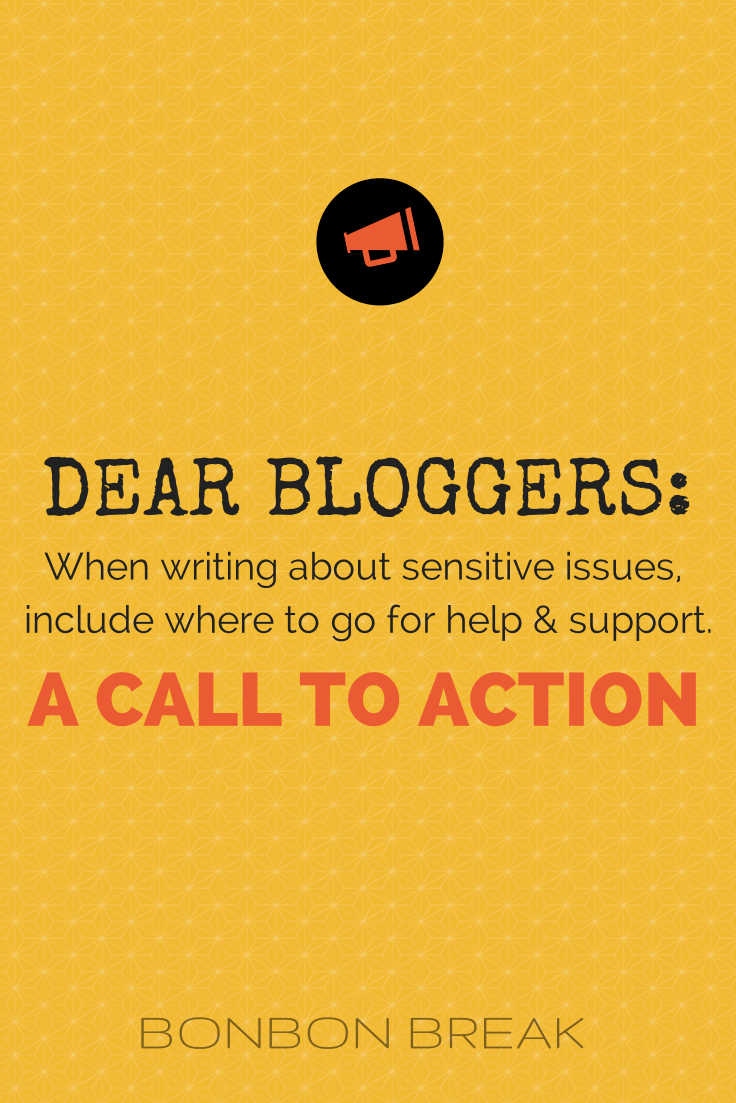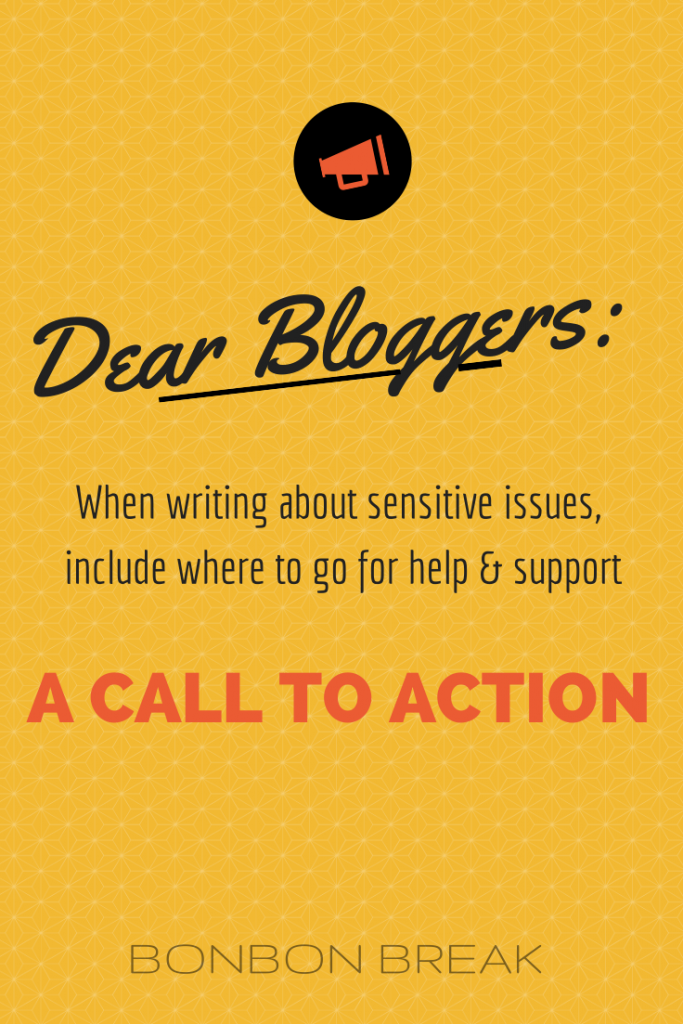Where to go for help and support


Dear Bloggers,
As content creators, we share stories about ourselves. Whether writing about activities for kids or our favorite recipes, we share what works in our lives and build relationships with our readers.
While some of us are brave enough to share tough topics like struggling with depression or marital conflict, we should question why a reader stumbled upon our post. Sometimes doing a Google search and reading a post is a safe way for readers to find help.
If you are covering topics like mental illness, depression, anxiety, suicide, eating disorders, along with your personal stories, bravo! But, have you considered adding a link to a hotline or a real, tangible resource for readers to find help? Of course, do whatever feels right to you. But, as someone who has had a ten year battle with generalized anxiety and borderline depression (that’s hard to type because it’s not something I talk about), there is a population of people reading these posts who actually NEED professional intervention.
I wonder if writing something like: “If you are confused or don’t know where to turn, here are some resources to find help” could make a difference for even one reader. I think the role and reach of a blogger is powerful and this resource list is a small way to make your posts even more influential.
In addition, there is a common practice that allows your reader to know you are writing about a topic that could “trigger” difficult emotions. For example, you can write “Warning: This post is about the loss of a child. ” at the beginning. Some people need to prepare themselves to read this type of content or this warning could let them know it isn’t something they are ready to ready at that moment.
Resource List by Topic
General list of HOTLINES from National Institute of Health if you want to give readers a number to call:
http://www.nih.gov/health/infoline.htm/
If you suggest they talk to their primary care doctor, and your reader doesn’t have a doc, here’s how they can find one:
http://healthfinder.gov/FindServices/default.aspx
ADD / ADHD:
Attention-Deficit Disorder Association: http://www.add.org/?page=finding_help_support
Children and Adults with Attention – Deficit /Hyperactivity Disorder : https://www.chadd.org/
Alcohol Abuse:
Rethinking Drinking: http://rethinkingdrinking.niaaa.nih.gov/
Al-anon: strength and hope for friends and families of problem drinkers – http://al-anon.alateen.org/
Depression:
Major signs of depression – http://www.livestrong.com/article/21963-major-signs-depression/
Depression and Bipolar Support Alliance – http://www.dbsalliance.org
National Suicide Prevention Lifeline – Need help? In the U.S., call 1-800-273-8255
Domestic Violence:
National Domestic Violence Hotline: http://www.thehotline.org/
Drug abuse:
For adults: http://www.drugabuse.gov/publications/seeking-drug-abuse-treatment
For teens: http://teens.drugabuse.gov/
Among military/veterans: http://www.drugabuse.gov/publications/topics-in-brief/substance-abuse-
among-military-veterans-their-families
Eating Disorders:
http://www.nationaleatingdisorders.org/find-help-support
Elder issues:
Senior Health: http://nihseniorhealth.gov/
Grief:
Adults: http://www.griefsupportservices.org/newgrief/
Kids: http://www.good-grief.org/
Heart Disease in Women:
Heart Truth: http://www.nhlbi.nih.gov/educational/hearttruth/
Infertility:
http://www.resolve.org/support-and-services/
LGBT:
PFLAG – Made up of parents, families, friends, and straight allies united with people who are lesbian, gay, bisexual, and transgender (LGBT), PFLAG is committed to advancing equality and societal acceptance of LGBT people through its threefold mission of support, education and advocacy.
Loss of a child/miscarriage:
Hope Xchange: http://www.hopexchange.com/
Silent Grief: http://silentgrief.com/ (Christian)
Mental Health:
Info help line (not 24 hour) http://www.nami.org/Content/NavigationMenu/Find_Support/Helpline/NAMI_Information_HelpLine.htm
Help for Mental Illnesses: http://www.nimh.nih.gov/health/find-help/index.shtml
Anxiety and Depression Association of America – Finding Help – https://www.adaa.org/finding-help
Overweight/obesity:
Overeaters Anonymous: http://www.overeatersanonymous.org/
PPD/PPA:
Post Partum Progress: http://www.postpartumprogress.com/
Postpartum Support International: http://postpartum.net/
Identifying PPD: http://kidshealth.org/parent/emotions/feelings/ppd.html
Rape, Abuse and Incest:
Rape, Abuse and Incest National Network: http://www.rainn.org/
Smoking:
Smoke Free.gov – http://smokefree.gov/
Please let us know if you are aware of any organizations or topics that should be added to this list. This is a collection of resources for you and your readers. These sites might not be THE answer, but we hope they will get you on the right path.
![]()

 A very special thank you to Katie Joyner from Happily Ever Mom for writing the intro and Dr. Deborah Gilboa from Ask Dr. G for gathering these resources for our contributors and readers. Our hope is to make the internet a better resource for those who are reaching out for help.
A very special thank you to Katie Joyner from Happily Ever Mom for writing the intro and Dr. Deborah Gilboa from Ask Dr. G for gathering these resources for our contributors and readers. Our hope is to make the internet a better resource for those who are reaching out for help.
![]()

